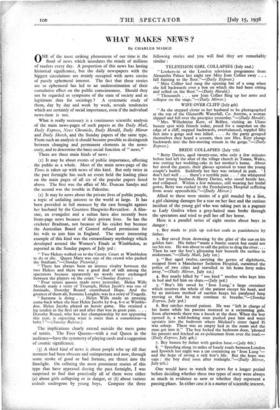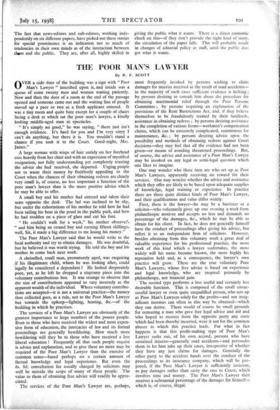WHAT MAKES NEWS ?
By CHARLES MADGE
' What is really necessary is a continuous scientific analysis of the main news-pages of such papers as the Daily Mail, Daily Express, News Chronicle, Daily Herald, Daily Mirror and Daily Sketch, and the Sunday papers of the same type. From such an analysis it should become possible to distinguish between changing and permanent elements in the news- story, and to determine the basic social function of " news."
There are three main kinds of news : (I) It may be about events of public importance, affecting the public as a whole. Most of the main news-page of the Times is taken up with news of this kind.. But only twice in the past fortnight has such an event held the leading place on the main pages of all six of the popular papers listed above. The first was the affair of Mr. Duncan Sandys and the second was the trouble in Palestine.
• (2) It may be news about the private lives of public people, a topic of unfailing interest to the world at large. It has been provided in full measure by the case brought against her husband by the Countess Haugwitz-Reventlow. A film- star, an evangelist and a sultan have also recently been front-page news because of their private lives. So has the cricketer Bradman, not because of his cricket but because the Australian Board of Control refused permission for his wife to join him in England. The most interesting example of this kind was the extraordinary mythology which developed around the Women's Finals at Wimbledon, as reported in the Sunday papers of July 3rd : " Two Helens walked on to the Centre Court at Wimbledon to do or die. Queen Mary was one of the crowd who packed the Stadium."—(Sunday Pictorial.) " There has always been an intense rivalry between the two Helens and there was a good deal of talk among the spectators because apparently no words were exchanged between the players on the court."—(Sunday Express.) " Four tennis queens made- news yesterday. Helen Wills Moody made a story of Triumph, Helen Jacob's was one of fortitude, Dorothy Round contributed Hope. And the greatest of them all, Suzanne Lenglen, was in a story of Tragedy. " Suzanne is dying . . . Helen Wills made an amazing come-back when she beat Helen Jacobs by 6-4, 6-o at Wimble- don. Helen Jacobs played an heroic game. She strained a leg tendon in the first set and after that was in great pain.. . . Dorothy Round, who lost her championship by not appearing this year, is expecting what is more than a consolation—a baby ! "(Sunday Referee.) The implications clearly extend outside the mere game of tennis. The Four Queens—with a real Queen in the audience—have the symmetry of playing cards and a suggestion of cosmic significance. • (3) A third kind of news is about people who up till that moment had been obscure and unimportant and now, through some stroke of good or bad fortune, are thrust into the limelight. On collating the most prominent stories of this type that have appeared during the past fortnight, I was surprised to find that practically all of them were either (a) about girls collapsing or in danger, or (b) about various ordeals undergone by young boys. Compare the three following stories and you will find they are remarkably similar • TELEVJSION GIRL COLLAPSES (July 2nd.) " Lookers-in at the London television programme from Alexandra Palace last night saw Miss Joan Collier sway . . . fall fainting to the floor."—(Daily Express.) " Miss Collier had sung the opening bar of a song when she fell backwards over• a box on which she had been sitting and rolled on the floor."7-(Daily Herald.) .
" Thousands . . . saw Joan Collier fling up her arms and collapse on the stage."—(Daily Mirror.) WIFE OVER CLIFF (July 4th) " As she stepped closer to her husband to be photographed at the top of the Glenariffe Waterfall, Co. Antrim, a woman slipped and fell over the precipice yesterday."—(Daily Herald).
" Mrs. Wilhelmina Kerr, • of Belfast, visiting an Ulster beauty spot with friends today, posed for a snapshot on the edge of a cliff, stepped backwards, overbalanced, toppled fifty feet into a gorge and was killed. . . . As the party grouped themselves they heard a scream, then saw Mrs. Kerr plunge backwards into the fast-moving stream in the gorge."--(Dail_v Express.) BRIDE COLLAPSES (July 7th) " Betty Davies aged twenty-one, who only a few minutes before had left the altar of the village church in Tonna, Wales, was cutting her wedding-cake in her mother's home. About her stood the guests, their glasses upraised to toast the young couple's health. Suddenly her face was twisted in pain. ' I don't feel well . . . there's a terrible pain . . .' she whispered to her young husband, Harry Davies, who stood beside her, and collapsed. Within a few minutes, still wearing her bridal gown, Betty was rushed to the Penrheiwtyn Hospital suffering from acute appendicitis."—(Daily Mirror.) Allied to these were stories of a girl mauled by a lion, a girl claiming damages for a scar on-her face and the curious incident of the young girl who was taking part in a pageant as Lady Godiva when a grey-haired man broke through the spectators and tried to pull her off her horse. - Here is a parallel series of eight stories about boys in danger : r. Boy made to pick up red-hot coals as punishment by father.
2. Boy saved from drowning by the glint of the sun on his golden hair. His father "made a frantic search but could not see his son. He was about to call the police to drag the river. . . . Then he saw the boy's glistening hair beneath the surface in midstream."---(Daily Mail, July 1st.) 3. " Boy aged twelve, carrying the germs of diphtheria, escaped from a Manchester Isolation Hospital, outwitted the police of two cities and travelled to his home forty miles away."—(Daily Mirror, July 1st.) 4. Boy nearly killed by " too kind " mother who kept him in bed and fed him on slops.—(July 3rd.) 5. " Boy's life saved by Iron Lung,' a large container which receives the whole of the patient except his head, and by an intricate method of suction keeps his paralysed lung moving so that he may continue to breathe."—(Sunday Express, July 3rd.) 6. Boy catches mental patient. He was "left in charge of his home while his parents motored to a swimming gala. Soon afterwards there was a knock at the door. When the boy opened it, a wild-looking man pushed past him and went upstairs into the bedroom where Michael's sister (aged 8) was asleep. There was an empty bed in the room and the man got into it." The boy locked the .bedroom door, 'phoned his parents and fetched an ex-policeman from over the road.— (Daily ExPress, July 4th.) 7. Boy beaten •by father with garden hose.—(July 6th.) 8. " Speeding along 7o miles of lonely roads between London and Ipswich last night was a car containing an Iron Lung '— and the hope of saving a sick boy's life. But the hope was vain : the boy died, soon after midnight."—(Dally Mirror, July 9t11-) One would have to watch the news for a longer period before deciding whether these two types of story were always as much in evidence as now or whether they represent a passing phase. In either case it is a matter of scientificinterest. The fact that news-editors and sub-editors, working inde- pendently on six different papers, have picked out these stories for special prominence is an indication not so much of tendencies in their own minds as of the interaction between them and the public. They are, after all, highly skilled in giving the public what it wants. There is a direct economic check on this—if they don't provide the right kind of story, the circulation of the paper falls. This will probably result in changes of editorial policy or staff, until the public does get what it wants.











































 Previous page
Previous page